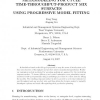Free Online Productivity Tools
i2Speak
i2Symbol
i2OCR
iTex2Img
iWeb2Print
iWeb2Shot
i2Type
iPdf2Split
iPdf2Merge
i2Bopomofo
i2Arabic
i2Style
i2Image
i2PDF
iLatex2Rtf
Sci2ools
113
click to vote
WSC
2007
2007
Metamodeling for cycle time-throughput-product mix surfaces using progressive model fitting
A simulation-based methodology is proposed to map the mean of steady-state cycle time as a function of throughput and product mix for manufacturing systems. Nonlinear regression models motivated by queueing analysis are assumed for the underlying response surface. To insure efficiency and control estimation error, simulation experiments are built up sequentially using a multistage procedure to collect data for fitting the models. The resulting response surface is able to provide a cycle-time estimate for any throughput and any product mix, and thus allows the decision maker to instantly investigate options and trade offs regarding their production planning.
| Added | 02 Oct 2010 |
| Updated | 02 Oct 2010 |
| Type | Conference |
| Year | 2007 |
| Where | WSC |
| Authors | Feng Yang, Jingang Liu, Mustafa Tongarlak, Bruce E. Ankenman, Barry L. Nelson |
Comments (0)

